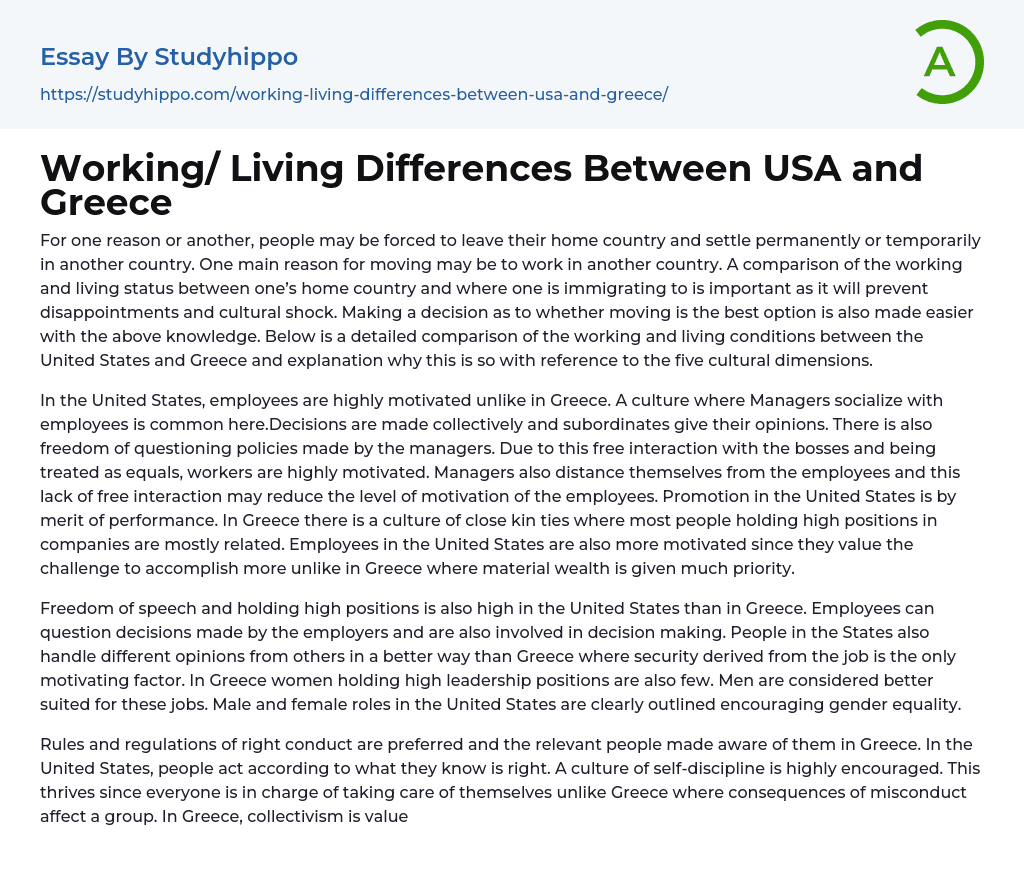For one reason or another, people may be forced to leave their home country and settle permanently or temporarily in another country. One main reason for moving may be to work in another country. A comparison of the working and living status between one’s home country and where one is immigrating to is important as it will prevent disappointments and cultural shock. Making a decision as to whether moving is the best option is also made easier with the above knowledge. Below is a detailed comparison of the working and living conditions between the United States and Greece and explanation why this is so with reference to the five cultural dimensions.
In the United States, employees are highly motivated unlike in Greece. A culture where Managers socialize with employees is common here.Decisions are made collectively and subordinates give
...their opinions. There is also freedom of questioning policies made by the managers. Due to this free interaction with the bosses and being treated as equals, workers are highly motivated. Managers also distance themselves from the employees and this lack of free interaction may reduce the level of motivation of the employees. Promotion in the United States is by merit of performance. In Greece there is a culture of close kin ties where most people holding high positions in companies are mostly related. Employees in the United States are also more motivated since they value the challenge to accomplish more unlike in Greece where material wealth is given much priority.
Freedom of speech and holding high positions is also high in the United States than in Greece. Employees can question decisions made by the employers and are also involved
in decision making. People in the States also handle different opinions from others in a better way than Greece where security derived from the job is the only motivating factor. In Greece women holding high leadership positions are also few. Men are considered better suited for these jobs. Male and female roles in the United States are clearly outlined encouraging gender equality.
Rules and regulations of right conduct are preferred and the relevant people made aware of them in Greece. In the United States, people act according to what they know is right. A culture of self-discipline is highly encouraged. This thrives since everyone is in charge of taking care of themselves unlike Greece where consequences of misconduct affect a group. In Greece, collectivism is valued while individualism is valued in the states.Phan and Butler(2008) say that in collectivism members belonging to one cultural grouping tend to express a certain kind of loyalty.
Successful negotiations in Greece must follow a procedure. One has to first familiarize themselves with the leadership hierarchy and also get to know and interact with members of the company to develop trust. Hospitality is important in the business interactions. This includes exchange of gifts and discussing business over drinks. In the United States it is different since prior interaction is not important for the negotiation to be successful. Business negotiations can also take place in boardrooms where drinks and gifts are not exchanged.
From this we see a culture of high power distinction, alertness and avoiding uncertainty and where collectivism is given priority in Greece. According to Fonseca 2014, people with low power distance participate in decision negotiation with those who hold high positions.
The people of the United States on the other hand values individualism are more risk takers and value ability and excellent skills. Due to globalization, knowing these differences makes integration easier.
References
- Phan, P. H. C., & Butler, J. E. (2008).Theoretical developments and future research in family business. Charlotte, N.C: IAP-Information Age Pub
- Fonseca M. (2014).Hovsteed’s five cultural dimensions.Portugal. SPBP publications
- Population essays
- Cultural Assimilation essays
- Demography essays
- Ethnographic essays
- Population Growth essays
- Anthropology essays
- Audience essays
- Charity essays
- Cultural Competence essays
- Emile Durkheim essays
- Gender Roles essays
- Generation essays
- Globalization essays
- Interpersonal Relationship essays
- People essays
- Race essays
- Social Change essays
- Social Class essays
- Social Movement essays
- Social Science essays
- Social Status essays
- Social Stratification essays
- Society essays
- Sociological Imagination essays
- Sociological Perspective essays
- Sociological Theories essays
- Stereotypes essays
- Web Dubois essays
- American Culture essays
- Car Culture essays
- Cultural Differences essays
- Culture Shock essays
- Different Cultures essays
- Indian Culture essays
- Mexican Culture essays
- Mormon essays
- Pop Culture essays
- Popular Culture essays
- Ageism essays
- Cultural Diversity essays
- Discrimination essays
- Diversity essays
- Gender Discrimination essays
- Multiculturalism essays
- Oppression essays
- Peer Pressure essays
- Racial Profiling essays
- Sexism essays
- Cultural Identity essays
- Athens essays




